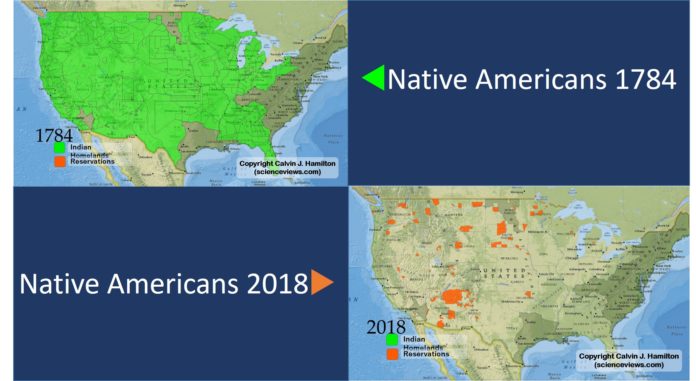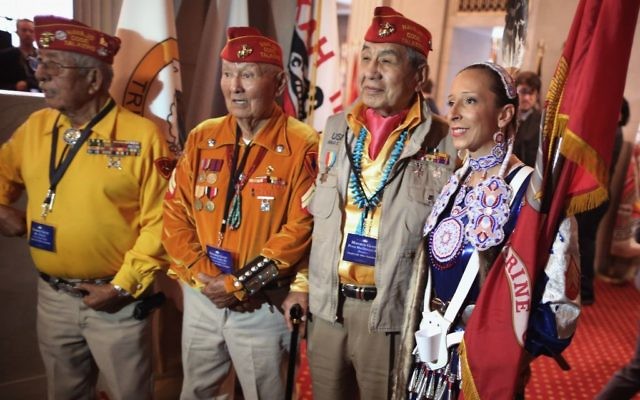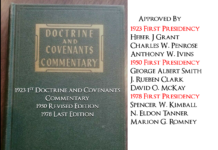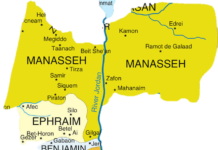“…When…first commanded to testify of these things they [The Three Witness] demurred and told the Lord the people would not believe them for the book concerning which they were to bear record told of a people who were educated and refined, dwelling in large cities; whereas all that was then known of the early inhabitants of this country was the filthy, lazy, degraded and ignorant savages that were roaming over the land. The Lord told us, in reply that he would make it known to the people that the early inhabitants of this land had been just such a people as they were described in the book, and he would lead them to discover the ruins of great cities, and they should have abundant evidence of the truth of that which is written in the book…” – David Whitmer, Interview with James H. Hart (Richmond, Mo., 21 August 1883), as printed in Deseret Evening News, Salt Lake City, Utah as published in Annotated Book of Mormon by David Hocking and Rod Meldrum page 560.
This abundant evidence of the truth is here. It is in the art and archaeology, the geopgraphy, records, science, and philosophy, and every known learning of the people of today. The Native Americans are and were indeed Children of God who had trugth among them and will be theirs again. We know this and preach this.
“Wherefore, this land is consecrated unto him whom he shall bring. And if it so be that they shall serve him according to the commandments which he hath given, it shall be a land of liberty unto them; wherefore, they shall never be brought down into captivity; if so, it shall be because of iniquity; for if iniquity shall abound cursed shall be the land for their sakes, but unto the righteous it shall be blessed forever.” 2 Nephi 1:7
The duty we Americans have for living in this wonderful land is to simply obey the Commandments. As we do this we are then able to bless the lives of others, especially our brothers and sisters the Lamanites and the Jews. I am impressed with the deep love the Prophet Enos had for his brethren the Lamanites.
Enos 1:10 “And while I was thus struggling in the spirit, behold, the voice of the Lord came into my mind again, saying: I will visit thy brethren according to their diligence in keeping my commandments. I have given unto them this land, and it is a holy land; and I curse it not save it be for the cause of iniquity; wherefore, I will visit thy brethren according as I have said; and their transgressions will I bring down with sorrow upon their own heads.
11 And after I, Enos, had heard these words, my faith began to be unshaken in the Lord; and I prayed unto him with many long strugglings for my brethren, the Lamanites.”
Our Prophet today, Presiden Nelson has warned us, “Whenever I hear anyone, including myself say, I know the Book of Mormon is True, I want to exclaim that’s nice but it isn’t enough. We need to feel deep the inmost parts of our hearts that the Book of Mormon is unequivocally the word of God. We must feel it so deeply that we wouldn’t want to live even one day without it. I might paraphrase President Brigham Young in saying, I wish I had the voice of seven thunders to wake up the people to the truth and power of the Book of Mormon.” Elder Russell M. Nelson Sept 30, 2017 General Conference.
As the Lord began to bring His people back to the Promised Land, we know other Israelites were already here although they didn’t have the priesthood amongst them.
A big test was now upon the New Settlers. How would we treat the people who already occupied this land? Even as we had been promised this land would we reach out to the Native Americans and help bless their lives, or would our greed take over and would we destroy this great people? We know what happened. What are we doing today to give back to these wonderful Natives so they may have the blessings of the Book of Mormon that we have?
1492: Extensive civilizations and religions were established across the continent by Native Inhabitants.
1790: Numbers of settlers where on the increase (pop. 4 million), demand for land forced the Indians westward.
1830: The Indian Removal Act saw the Indians east of the Mississippi River moved to the west.
1860: Discovery of gold in the west and establishment of reservations, diminished the Native land base.
1890: A further 90 million acres of Indian land was lost due to allotment policies.




Trail of Tears

- The Book of Mormon, which contained Lehi’s prophecies, was first offered for sale in Grandin’s Bookstore March 26, 1830. The infamous “Indian Removal Act” was passed by Congress on May 28, 1830.
- In speaking to the Lamanites and others who are disobedient, the Book of Mormon said, “and he will take away from them the lands of their possessions, and he will cause them to be scattered and smitten.” 2 Nephi 1:10-11
- At the beginning of the 1830s, nearly 125,000 Native Americans lived on millions of acres of land in Georgia, Tennessee, Alabama, North Carolina and Florida–land their ancestors had occupied and cultivated for generations. By the end of the decade, very few natives remained anywhere in the southeastern United States. Working on behalf of white settlers who wanted to grow cotton on the Indians’ land, the federal government forced them to leave their homelands and walk thousands of miles to a specially designated “Indian territory” across the Mississippi River. This difficult and sometimes deadly journey is known as the “Trail of Tears.”
- Indian removal took place in the Northern states as well. In Illinois and Wisconsin, for example, the bloody Black Hawk War in 1832 opened to white settlement millions of acres of land that had belonged to the Sauk, Fox and other native nations.
- If we as Americans don’t wake up and strive more diligently to obey the Lord we will have the same horrible fate of our good brethren the Lamanites.
- The promise of a blessed land is only to those who are righteous.
A Jewish Duty: Creating A More Representative Judiciary
By RABBI SHMULY YANKLOWITZ January 2, 2014,
Of all the wisdom and political theory from the great Thomas Paine that has endured perhaps some of his wisest words were those he imparted on the eve of the American revolution: “Those who expect to reap the blessings of freedom must… undergo the fatigue of supporting it.” (The American Crisis, Number IV: Philadelphia, September 12 [1777]). Paine’s words are both thoughtful and inspiring and serve as a reminder that we must constantly defend and enhance our justice system in America to support freedom.
President Obama has nominated Diane J. Humetewa to serve on the U.S. District Court for the district of Arizona as a federal judge. Humetewa, Professor of Practice at the Sandra Day O’Connor College of Law at Arizona State University and a member of the Hopi tribe, helped establish one of the nation’s first programs for victim services, and was later appointed by President George W. Bush to be the first Native American woman to serve as the U. S. Attorney for the District of Arizona.

Update: “Confirmed in 2014 as the first Native American woman and enrolled tribal member to serve as a federal judge, Humetewa is one of three Native Americans in history to serve in this position.” Source
Continued from RABBI SHMULY YANKLOWITZ, “She previously served as counsel for the Senate Committee on Indian Affairs and to the Deputy Attorney General for the U.S. Justice Department, and was a member of the U.S. Sentencing Guideline Commission, Appellate Court Judge for her tribe, and chairperson for the Arizona U.S. Magistrate Judge Merit Selection Committee. If she is confirmed, she will be the first Native American woman to serve as a federal judge, and the only active judge. Senator John McCain is among those who are supporting her candidacy, making it likely that she will receive at least some bipartisan support.
Native American tribes have been grossly mistreated by the United States for centuries, with hundreds of broken treaties, stolen land, brutal violence and even murder characterizing our relationship with America’s native peoples. One of the grossest examples of this miscarriage of justice occurred to the Cherokee nation, which had been located in the state of Georgia and some other areas of the southeast.Wary of the intentions of Georgia to seize its land, the Cherokee undertook numerous efforts to maintain their land by attempting to assimilate into American culture, including abandoning their traditional lifestyle, adopting the Christian religion, establishing a written language, a constitution, school system, and negotiating treaties with the United States in 1785, 1790, 1791, 1792, 1794, 1804, 1805, 1807, 1816, and 1819. Unfortunately for the Cherokee, President Andrew Jackson, who hated Native Americans, was elected President in 1828. President Jackson had Congress pass the Indian Removal Act of 1830, which authorized the removal of all Native Americans in the east to land west of the Mississippi river. In addition to the President and Congress’ efforts, Georgia also passed laws that facilitated the confiscation of Cherokee land.
In the spirit of assimilation, the Cherokee Nation utilized the American justice system and sued the State of Georgia. The case eventually reached the Supreme Court, where the Chief Justice, the Federalist John Marshall, was a strong political opponent of President Jackson (as he had also opposed President Thomas Jefferson 30 years earlier), possibly indicating a fairer solution to the forced removal. Contrarily, however, Chief Justice Marshall refused to intervene on behalf of the Cherokee, and evidenced the paternalistic, racist philosophy of his era in his infamous decision Cherokee Nation v. the State of Georgia (1831). In the opinion, Marshall wrote that the Cherokee did not qualify as a foreign nation deserving treaty rights, in spite of the numerous treaties that had been ratified by the Senate, and that they constituted “domestic dependent nations.” In Marshall’s words:
They occupy a territory to which we assert a title independent of their will, which must take effect in point of possession when their right of possession ceases; meanwhile, they are in a state of pupilage. Their relations to the United States resemble that of a ward to his guardian. They look to our Government for protection, rely upon its kindness and its power, appeal to it for relief to their wants, and address the President as their Great Father.
The Cherokee were the fifth Native American tribe pushed west in 1838, in a forced march that became known as the “Trail of Tears.” According to historians, the march resulted in the deaths of over 5,000 Cherokees. Originally, the U.S. government promised land and aid to Native American tribes. However, the United States officially began to view Native land as “unassigned territory,” and subsequently in 1885, 1889, and 1893, land in Oklahoma was opened to thousands of “settlers” who quickly journeyed west and claimed the land for their own. This mass repurposing further eroded Native American lands, and in 1907 Oklahoma was formally recognized as a state. While Native American tribes, to this day, have some land (reservations), these lands are almost invariably located on marginal land that has little value and little agricultural productivity.

While this all seems like distant history, the difficulty of obtaining any justice for Native Americans remains a problem; likewise, resistance to considering members of Native American tribes as equal citizens is still strong. Today, the House of Representatives is resisting efforts to reauthorize the Violence Against Women Act because, among other things, it would allow Native American tribal police the right to apprehend non-natives who attack women on tribal land. As a result of gap between State and tribal law, female victims of violence are left to suffer at the hands of violent offenders without legal recourse. For example, Diane Millich, a Southern Ute Native American living on tribal land, was the victim of domestic violence by her husband, a white man. The Southern Ute Tribal Police were not allowed to arrest her husband because he was not a Native, and the local County Sheriff’s office could not go on the tribal land to arrest him. When Millich’s husband traveled onto Federal Bureau of Land Management land and wounded another person with a firearm, he was finally arrested, but then only after the authorities literally measured the area of the crime with a tape measure to ensure the crime was committed on non-tribal land. Native American women are 2.5 times more likely to be raped than other American women, and about 60 percent will experience the horrors of domestic violence. The loopholes in State, Federal, and Tribal law are what allow Native women to be victimized; it is imperative that action be taken by Congress to pass the Violence Against Women Act.
As Jews, we know that justice for oppressed individuals and populations is at the core of the Jewish tradition and built into human conscience. This was our core commitment, even prior to the Sinai revelation, as Rabbi Abraham Joshua Heschel explained:
The moral imperative was not disclosed for the first time through Abraham or Sinai. The criminality of murder was known to men before…What was new was the idea that justice is an obligation to G-d, His way not only His demand; that injustice is not something G-d scorns when done by others but that which is the very opposite of G-d; that the rights of humans are not legally protected interests of society but the sacred interest of G-d. G-d is not only the guardian of moral order, ‘the Judge of all the earth,’ but One who cannot act unjustly (Genesis 18:25,” (G-d in search of Man, 136).
We must approach communities that we do not understand with humility. Political philosopher Jean-Jacques Rousseau wrote that we fail to truly understand and comprehend what others have to offer, be it Africans, Peoples of the East Indies, or Native Americans, when we exploit, beat into submission, and judge others through our perceived understandings of right/wrong and enlightened/savage. We are, in Rousseau’s language, “pretend[ing] to judge mankind:”
Although the inhabitants of Europe have for the past three or four hundred years overrun the other parts of the world and
are constantly publishing new collections of travels and reports, I am convinced that the only men we know are
Europeans…we do not know the Peoples of the East Indies, who are exclusively visited by Europeans more interested in
filling their purses than their heads. All of Africa and its numerous inhabitants, as remarkable in character as they are
in color, still remain to be studied; the whole earth is covered with Nations of which know only the names, and yet we
pretend to judge mankind!
Tragically for Native Americans, our legal system reflected the ignorance and violence of our singular perspective of justice. The consequences of that reverberate not only in our history books but are currently being experienced on tribal lands and in the halls of our political and legal institutions.
One important way of ensuring that the American legal system is more fair and representative of all of our nation’s citizens is by having more diverse judicial nominees and appointees. Native Americans are a minority group that has infamously and tragically been ignored and left without adequate representation. President Obama has stated that when considering judicial nominees he looks for individuals who understand “that justice isn’t about some abstract legal theory” and who “identif(y) with people’s hopes and struggles as an essential ingredient for arriving at just decisions and outcomes.” Justice is not all intellect. It requires empathy, personal narrative, and being deeply connected to the people. Confirming Professor Diane J. Humetewa as a District Judge, and reauthorizing the Violence Against Woman Act, will be at least a positive step toward equal justice.

Rabbi Dr. Shmuly Yanklowitz is the Executive Director of the Valley Beit Midrash, the Founder & President of Uri L’Tzedek, the Founder and CEO of The Shamayim V’Aretz Institute and the author of “Jewish Ethics & Social Justice: A Guide for the 21st Century.” Newsweek named Rav Shmuly one of the top 50 rabbis in America.” https://jewishweek.timesofisrael.com/a-jewish-duty-creating-a-more-representative-judiciary/
Read my blog about some of the Lamanites in America who are Heores to all and especially to their own people. https://www.bofm.blog/josephs-remnant-lamanites-in-todays-america/






